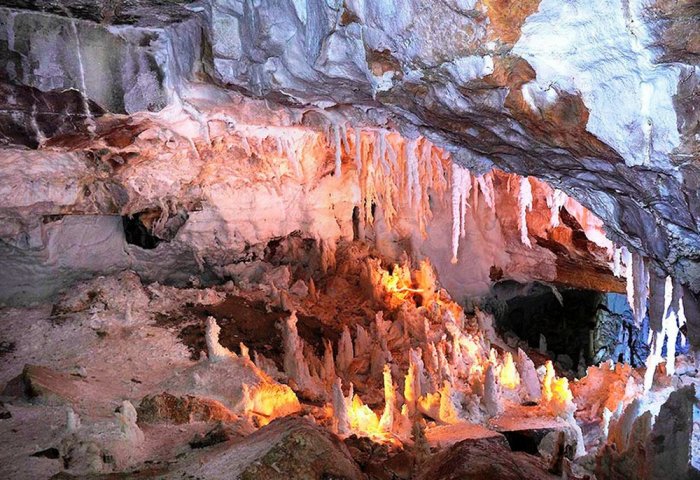WNAM MONITORING: The Garlyk caves, located on the slopes of the Koytendag mountain range, are unique natural monuments unparalleled in Eurasia. Their inscription on the UNESCO World Heritage Site recognized their exceptional value.
The cave system gets its general name from the nearby village of Garlyk. This underground realm consists of about 60 registered caves, ranging in length from a few hundred meters to several kilometers.
The caves feature speleothem formations of gypsum, calcite, aragonite in the form of stalactites, stalagmites, stone curtains, creating unique galleries, passages, halls and labyrinths.
The most famous caves are Hashimeyuk, Kap-Kutan, Tashyurek, Stone Flower, and Vertical (Cave of the Dead).
The Hashimeyuk cave consists of numerous halls and labyrinths with heights ranging from 5 to 8 meters. Its total length is 3.5 km. Local historians and archaeologists believe that this cave was the source of marble onyx used for decorating Tamerlane’s tombs.
The name Kap-Kutan is derived from two words: “gap” meaning “dish, bowl” and “gotan,” which in the local dialect means “enclosure.” During inclement weather, shepherds grazing their sheep near the cave would drive their flocks inside to shelter from rain and wind.
The uniqueness of this cave lies in its underground cavities called the Hall of Grandfather Frost and Snow Maiden, Jellyfish Hall, Fairy Tale Hall, Bathroom Hall, and others. It ranks third in the world in terms of minerals.
The Garlyk cave has several grottoes, the largest of which is the Stalactite Grotto. Its length reaches 190 meters, and its height is 10 meters. Unusual stalagmites reach 6 meters in height and 1 meter in diameter. The air temperature inside the cave is 20 degrees Celsius.
The Garlyk caves attract numerous tourists from Turkmenistan and other countries who wish to explore the natural beauty and diversity of karst formations. It is an excellent destination for lovers of pristine corners and speleology.








